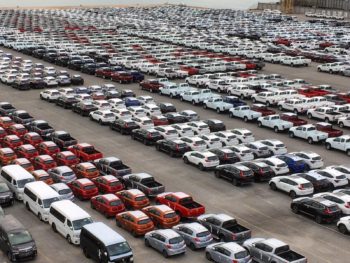New car registrations at second lowest level in 30 years but EV uptake soars
UK new car registrations plummeted 20.6% in May as the chip shortage continued to hamper deliveries – but battery electric vehicle uptake soared.

UK new car registrations declined 20.6% to 124,394 units in the second weakest May in three decades after locked-down 2020
A total of 124,394 new cars were registered last month – marking the second weakest May in three decades and with only locked-down 2020 coming in lower, according to the latest figures from the Society of Motor Manufacturers and Traders (SMMT).
The decline last month is marked by its comparison with the first full month of reopened showrooms in May last year. But, tellingly, the market is 32.3% below the 2019 pre-pandemic level and demonstrates the impact of continued global supply chain disruptions – the SMMT has stressed that actual demand and order books remain strong.
Fleets were particularly hard hit as carmakers continue to prioritise higher-margin sales to private buyers. As a result, fleet registrations were down 29.9% and ‘Business’ registrations to companies with fewer than 25 vehicles fell 27.1% while private registrations fell just 10.3%. As a result, the private consumer side of the market accounted for 53.2% of uptake.
Year-to-date, the overall market fell by 8.6% and is 40.6% below the five-year average. Fleet registrations were down 26.0%, with smaller business registrations up 13.5% and private registrations growing by 11.4%.
Battery electric vehicle uptake continues to provide a bright spot though – it increased by 17.7% in May, representing 12.4% of the month’s registrations or one in eight new cars joining the roads, as manufacturers prioritise their supply.
And while plug-in hybrids fell 25.5% last month, hybrids were up 12.0% and took an 11.7% share of the market, meaning deliveries of electrified vehicles as a whole accounted for nearly a third (30%) of the market.
The SMMT said that incentives and infrastructure were key to continued momentum in electric vehicle take-up.
Mike Hawes, chief executive, commented: “This requires an acceleration in the rollout of accessible charging infrastructure to match the increasing number of plug-in vehicles, as well as incentives for the purchase of new, cleaner and greener cars.
“Delivering on net zero means renewing the vehicles on our roads at pace but, with rising inflation and a squeeze on household incomes, this will be increasingly difficult unless businesses and private buyers have the confidence and encouragement to do so.”
Meanwhile, Novuna Vehicle Solutions said that it was highly likely that new EV registrations would reach parity with petrol and diesel vehicles in a matter of months.
Jon Lawes, managing director, continued: “It’s a psychologically important tipping point, and one we are accelerating towards so quickly because prolonged supply chain challenges are strangling production across the industry, causing manufacturers to prioritise the supply of EVs in the face of healthy demand.
“Supply is constrained on both sides of the market, but we’ve yet to see recently emerging fears around battery supply do much to curtail the production of EVs, and certainly not to the same extent as across the rest of the industry.”
But he added a note of caution: “We’re very much in a sellers’ market, which points to further price rises, and longer waiting lists which means consumers and commercial fleet operators need to plan well ahead and consider extending existing leasing contracts to cover the delay in new vehicle deliveries.”
And Deloitte said that further work was needed to help fleets go electric.
Jamie Hamilton, automotive director and head of electric vehicles, commented: “Despite the ongoing success of EVs in the new car market, recent figures from the SMMT showed that fewer than one in 50 vehicles on the UK’s roads are electric. This highlights the challenge ahead in fully decarbonising road transport in the UK.
“Fleets have an important role to play in speeding up the transition to electric. However, fleet managers need to be given more support in order to realise the benefits and opportunities associated with a holistic transition to electric, rather than just a standard ‘vehicle-by-vehicle’ replacement.”
Lex Autolease has also called for work to ensure that the supply of available charge points across the country is able to withstand the influx of electric cars on the roads.
“This is particularly important at a time when the second-hand EV market is beginning to gather momentum to encourage more motorists to make the electric switch,” outlined Meryem Brassington, electrification propositions lead.
She added: “It has also been reassuring to see the significant increase in take-up of the domestic EV charging grant across the UK, with 121,001 devices installed in the 12 months to 1 April 2022 – an 86% increase compared to the previous year.
“However, plugging any gaps between EV car sales and charging infrastructure installations now is critical to maintain the goodwill that exists and achieve the UK’s longer-term electrification ambition.”












